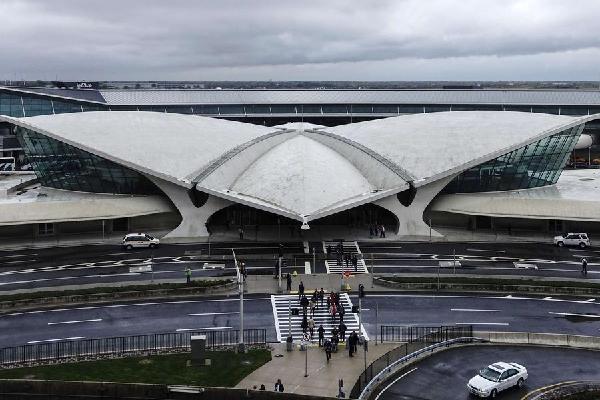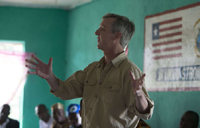Ebola screening starts at New York's JFK airport
Updated: 2014-10-12 07:56
(Agencies)
|
|||||||||||
 |
| People make their way at the international arrival terminal at JFK airport in New York October 11, 2014. [Photo/Agencies] |
NEW YORK - Medical teams at New York's JFK airport, armed with Ebola questionnaires and temperature guns, began screening travelers from three West African countries on Saturday as US health authorities stepped up efforts to stop the spread of the virus.
 |
| UN warns of Ebola threat as 'unprecedented' |
Nearly all of the passengers traveling to the United States from those countries arrive at JFK, Newark Liberty, Washington Dulles, Chicago O'Hare and Hartsfield-Jackson Atlanta. The new procedures will begin at the other four airports on Thursday.
Buntouradu Bamgoura, 54, who was born in Guinea and lives in the United States, said she went through the new screening process after arriving from her homeland with a Paris stopover. "Yes, they did take my temperature," she said when asked by a reporter. "It took, I think, 15 minutes."
The screenings, which will affect only a tiny fraction of overall passengers arriving at JFK, are being conducted by the Department of Homeland Security's Customs and Border Protection (CBP), under the direction of the Centers for Disease Control and Prevention.
There are no direct flights from the affected countries, so CBP staff identify passengers who have flown from there by looking at information about their trip and checking passports, R. Gil Kerlikowske, the CBP commissioner, told a news conference at JFK on Saturday morning.
Using infrared temperature guns, staff will check for elevated temperatures among passengers whose journeys began or included a stop in one of the three African countries.
As a temporary measure, the CBP has authorized US Coast Guard personnel to take temperatures, but the CBP will contract "professional medical staff" in the future, Kerlikowske said.
Screeners will also assess passengers for signs of potential illness and ask them questions about their health and whether they may have come into contact with an Ebola patient.
For those with a fever or other symptoms or possible exposure to Ebola, the CDC will decide what steps to take next. Health authorities may decide to take a person to a hospital for evaluation, testing and treatment, or to quarantine or isolate the patient under federal law, according to the CDC.
Related Stories
UN warns of Ebola threat as 'unprecedented' 2014-10-11 09:59
WHO: East Asia at risk of Ebola, but more prepared 2014-10-10 20:37
Intl communities pledge swift actions to Ebola crisis 2014-10-10 11:01
China sending new team to tackle Ebola 2014-10-09 20:53
Ebola nurse rushed to Australian hospital with fever 2014-10-09 14:43
US Ebola patient dies 2014-10-09 09:54
Today's Top News
China, Germany sign $18.1 billion deals
Nobel Laureate in eyes of Chinese
China reports huge tourism deficit
Suspected trail of Putin's tiger found
Chinese, EU militaries hold talks
Beijing to see six-day holiday during APEC
China, Germany to sign vital pact
Patrick Modiano wins Nobel
Hot Topics
Lunar probe , China growth forecasts, Emission rules get tougher, China seen through 'colored lens', International board,
Editor's Picks

|

|

|

|

|

|





